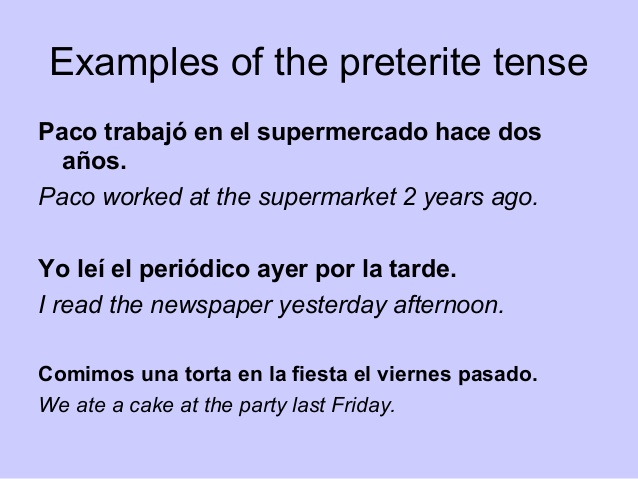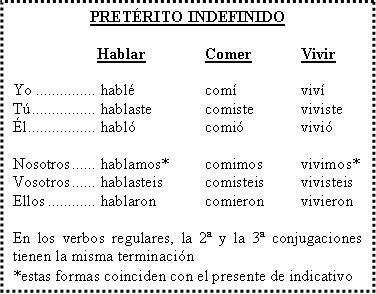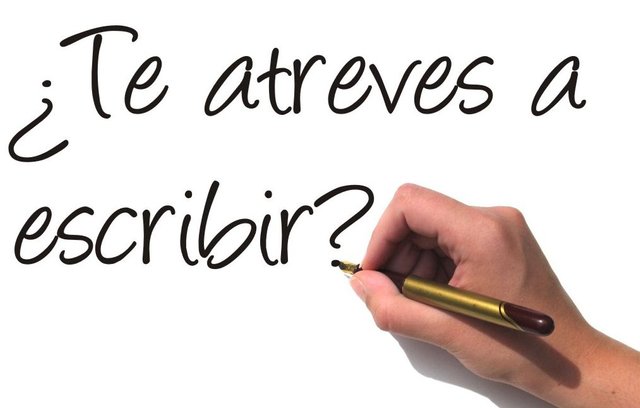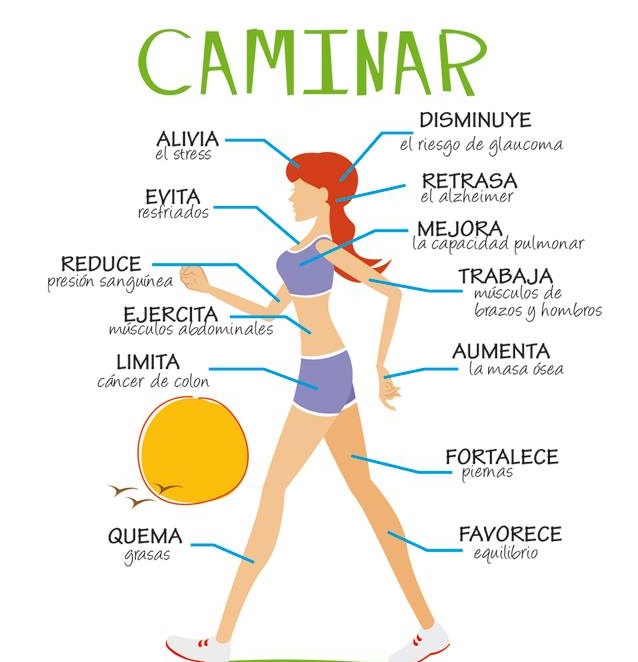Good Afternoon Steemians!

This lesson is the sister of my last Spanish lesson which was "How to Use Simple Past Tense (Preterite) For AR Verbs in Spanish which can be found here: https://steemit.com/spanish/@vegansilverstack/how-to-use-simple-past-tense-preterite-for-ar-verbs-in-spanish. In this lesson I will teach how to conjugate and use the preterite tense for the three different verb endings:- AR/-ER/-IR verbs.
The preterite tense in Spanish is used to tell simple past tense actions such as "I walked" or "You fell down." There is another past tense in Spanish called the Imperfect Tense, which would be more for actions that were happening or actions that people used to do. We might say "I was eating a cheeseburger" (and then something else happened). In Spanish we would use the imperfect tense for that which will be in another lesson. We are focusing more on just simple past tense actions that have happened and they are done with.

(Img cite: https://www.pinterest.com/pin/436356651367558088/)
Now, you might be familiar that there are three different endings that verbs in Spanish use: -AR, -ER, and -IR verbs.
-AR verbs act alone in conjugations but -ER and -IR verbs are conjugated the same in the present tense except for the nosotros and vosotros form. In the preterite (simple past) form, they are conjugated the same.
Remember that in the present tense we would take of the -ER or -IR ending and replace it with any of our endings for their respective subject or subject pronouns. These are the present tense endings for -ER verbs: -o, -es, -e, -emos, -éis, -en.
For example, the verb comer means to eat.

(Img. cite: https://es.123rf.com/photo_14019561_nino-pequeno-con-un-apetito-de-comer-mas-sandia.html)
So, I could say:
yo como = I eat
tú comes = you eat
Él/ella/usted come = he/she/you (formal) eat
Nosotros(as) comemos = we eat
Vosotros(as) coméis = you all (Spain) eat
ustedes/ellos(as) comen = you all (everywhere else)/they eat
For -IR verbs only the nosotros and vosotros forms change from the -ER endings.
Example verb: escribir which means "to write".

(Img. cite: http://www.inboundcycle.com/blog-de-inbound-marketing/10-consejos-cortos-para-escribir-mejor-en-2015)
Again, take off the -IR ending and replace it with our -IR endings which are -o, -es, -e, -imos, ís, -en.
Notice how -emos and -éis from -ER verbs are now -imos and -ís for -IR verbs. Ok.
yo escribo = I write
tú escribes = you write
él/ella/usted escribe = he/she/you (formal)write
nosotros(as) escribimos = we write
vosotros(as) escribís = you all (Spain) write
ustedes/ellos(as) = you all (everywhere else)/they write
This formula works with any regular -ER/-IR verbs (using their respective endings). There are irregular verbs which we will talk about later.
Now that we know how to conjugate both regular -ER/-IR verbs in the present tense, we can go ahead and do the same but using the preterite (past simple) tense. All we do is change the endings.
In my last lesson, we learned how to conjugate -AR verbs in the past simple (preterite) tense, so I will review the endings of the -AR verbs quickly with you.
Let's use the verb caminar which means "to walk"

(Img. cite: http://www.armamecurvyblog.com/tag/caminar/)
Now the endings for preterite tense -AR verbs are the following: -é, -aste, -ó, -amos (same as present tense), -asteis, -aron
So, we can now conjugate the verb.
yo caminé = I walked
tú caminaste = you walked
él/ella/usted caminó = he/she/you (formal) walked
nosotros(as) caminamos = we walked
vosotros(as) caminasteis = you all (Spain) walked
ellos(as)/ustedes caminaron = they/you all (everywhere else) walked.
(Note: Spain does use "ustedes" but only for formality, otherwise they use "vosotros". All other part of the Spanish-speaking world would just use "ustedes" all of the time.)
Now, let's get back to the topic of the day: -ER/-IR preterite tense conjugation.
Let's take our same -ER verb we used in our present tense example, and conjugate it in the preterite tense.
First we need to know what the -ER/-IR verb endings are for preterite tense. We are lucky, because -ER/-IR verb endings are the same in the preterite tense: -í, iste, -ió, -imos, -isteis, -ieron.
yo comí = I ate
tú comiste = you ate
él/ella/usted comió = he/she/you(formal) ate
nosotros(as) comimos = we ate
vosotros(as) comisteis = you all (Spain) ate
ustedes/ellos(as) comieron = you all (everywhere else)/they ate
Now let's conjugate our same -IR verb we used above in the preterite tense:
yo escribí = I wrote
tú escribiste = you wrote
él/ella/usted escribió =he/she/you (formal) wrote
nosotros(as) escribimos = we wrote (notice that this is the same conjugation as the present tense "we write" so context is everything when speaking.
vosotros(as) escribisteis = you all (Spain) wrote
ustedes/ellos(as) escribieron = you all (everywhere else)/they wrote
I'm going to write a few sentences using other -ER/-IR verbs but using the same endings to show you really how simple it is:
- Yo bebí una cerveza anoche. = I drank a beer last night. (beber = to drink)
- Tú naciste en Chicago. = You were born in Chicago. (nacer = to be born)
- Ella vivió en Madrid por cinco años. = She lived in Madrid for five years. (vivir = to live)
- Nosotras recibimos la carta el sábado. = We (all girls) received the letter on Saturday.
- Vostros decidisteis ir en coche. = You all (Spain) decided to leave by car.
- Ustedes reconocieron al hombre sospechoso de anoche, ¿verdad? = You all (everywhere else) recognized the suspicious man from last night, right?

(Img cite: https://www.slideshare.net/sraellner/preterite-vs-imperfectppt)
I know this was a very long lesson, but I hope you took the time to read through to better your Spanish skills!
Don't forget to leave a comment and upvote if you enjoyed it!
Thanks for stopping by,

Reminds me of when I used to be Spanish teacher back in the day! So many lesson plans!
Thanks for sharing your post! :) Very interesting material! @vegansilverstack
Downvoting a post can decrease pending rewards and make it less visible. Common reasons:
Submit
Hehe yep! I'm lucky because basically all of mine are all done from last year! Muahahaha!
Downvoting a post can decrease pending rewards and make it less visible. Common reasons:
Submit
This post received a 2.4% upvote from @randowhale thanks to @vegansilverstack! For more information, click here!
Downvoting a post can decrease pending rewards and make it less visible. Common reasons:
Submit